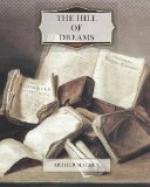He muttered something about being rather tired, and sat down to his tea. It was not cold, for the “cozy” had been put over the pot, but it was black and bitter strong, as his cousin expressed it. The draught was unpalatable, but it did him good, and the thought came with great consolation that he had only been asleep and dreaming queer, nightmarish dreams. He shook off all his fancies with resolution, and thought the loneliness of the camp, and the burning sunlight, and possibly the nettle sting, which still tingled most abominably, must have been the only factors in his farrago of impossible recollections. He remembered that when he had felt the sting, he had seized a nettle with thick folds of his handkerchief, and having twisted off a good length, and put it in his pocket to show his father. Mr. Taylor was almost interested when he came in from his evening stroll about the garden and saw the specimen.
“Where did you manage to come across that, Lucian?” he said. “You haven’t been to Caermaen, have you?”
“No. I got it in the Roman fort by the common.”
“Oh, the twyn. You must have been trespassing then. Do you know what it is?”
“No. I thought it looked different from the common nettles.”
“Yes; it’s a Roman nettle—arctic pilulifera. It’s a rare plant. Burrows says it’s to be found at Caermaen, but I was never able to come across it. I must add it to the flora of the parish.”
Mr. Taylor had begun to compile a flora accompanied by a hortus siccus, but both stayed on high shelves dusty and fragmentary. He put the specimen on his desk, intending to fasten it in the book, but the maid swept it away, dry and withered, in a day or two.
Lucian tossed and cried out in his sleep that night, and the awakening in the morning was, in a measure, a renewal of the awakening in the fort. But the impression was not so strong, and in a plain room it seemed all delirium, a phantasmagoria. He had to go down to Caermaen in the afternoon, for Mrs. Dixon, the vicar’s wife, had “commanded” his presence at tea. Mr. Dixon, though fat and short and clean shaven, ruddy of face, was a safe man, with no extreme views on anything. He “deplored” all extreme party convictions, and thought the great needs of our beloved Church were conciliation, moderation, and above all “amolgamation”—so he pronounced the word. Mrs. Dixon was tall, imposing, splendid, well fitted for the Episcopal order, with gifts that would have shone at the palace. There were daughters, who studied German Literature, and thought Miss Frances Ridley Havergal wrote poetry, but Lucian had no fear of them; he dreaded the boys. Everybody said they were such fine, manly fellows, such gentlemanly boys, with such a good manner, sure to get on in the world. Lucian had said “Bother!” in a very violent manner when the gracious invitation was conveyed to him, but there was no getting out of




